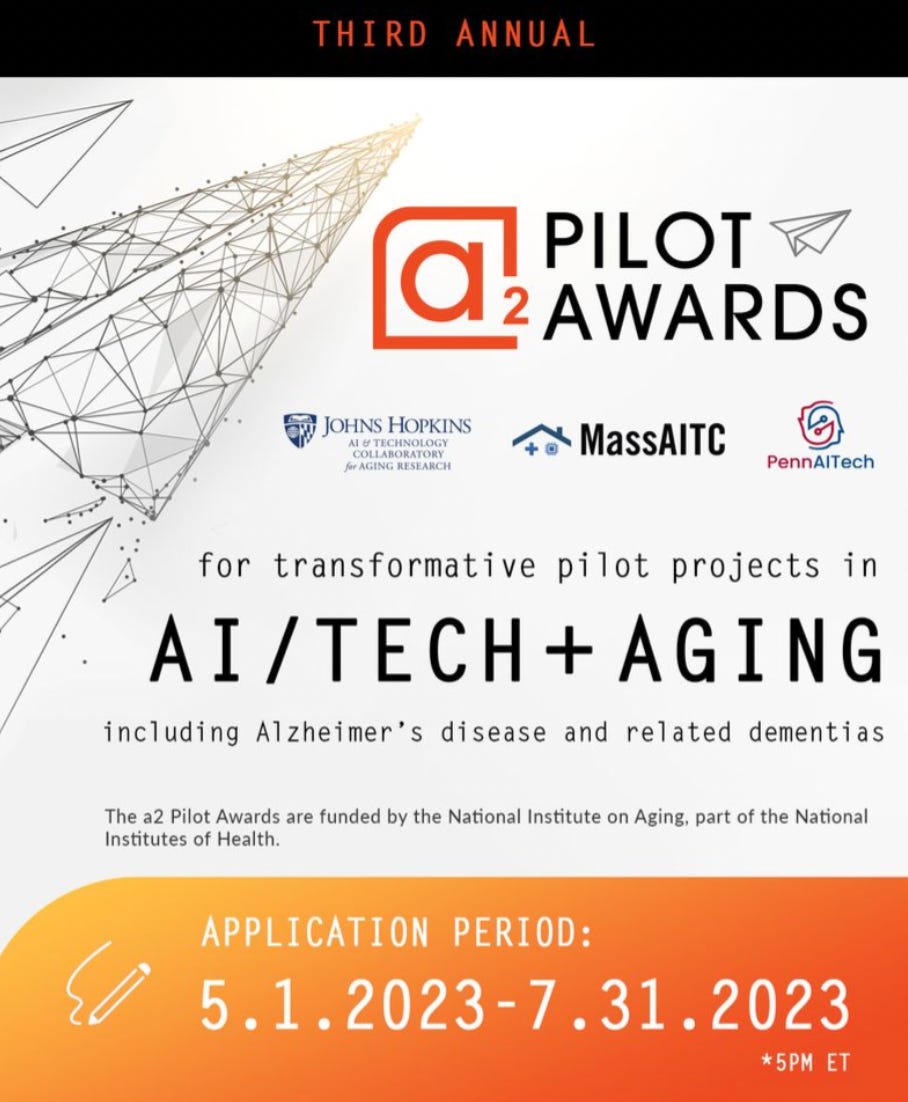Spotlight on the A2 Collective
LF64 | If you're developing an innovative agetech / dementia solution with some research component, the A2 Collective 7/31 deadline should be on your radar
Introducing the A2 Collective
The A2 Collective is a program with $65m of NIH funding that is “dedicated to helping Americans live longer, healthier lives through the application of artificial intelligence (AI) and emerging technologies.” Their approach is designed to be collaborative and to combine breakthrough tech, academic rigour and startup speed.
It operates via three ”collaboratories” - Johns Hopkins, U Mass Amherst and the University of Pennsylvania - and a secretariat. I recently sat down with Stephen Liu, the program’s Managing Director for Marketing and Business Development. His background is as a tech entrepreneur and in the venture world so he’s used to working with a variety of startups. He partnered up with Rose Li to submit the initial grant application and to now manage the process. The key takeaways below come from that conversation.
$40m of the $65 total budget is for the Pilot Awards.
The first 33 Pilot awardees from Cohort 1 are here. They’ll be announcing their Cohort 2 winners shortly.
They have a goal to fund 150 projects within the program’s five year period.
The deadline for the Third Annual Pilot Awards is coming up fast - at the end of July.
They provide up to $200k per project, and will cover the direct project costs (via invoice) and potentially also some indirect costs.
They’re looking for collaboratives that bring together novel tech with academic rigor - it’s still an NIA funded process so there needs to be evidence it’s pushing the research frontiers.
Key requirements are using new (or adapted) technology to support dementia / agetech and have an academic partner to provide scientific context to satisfy the NIA. The program also needs strong study design, e.g. to show what the costs will be where.
An approved university could be a good partner as in addition to the direct costs they could get a further 40% of indirect costs back.
This is not quite free money, but could be a valuable, non-dilutive, boost for the right startup. Given it’s capped at $200k and does require an academic partner (and a sufficiently robust NIA-approved application), it won’t be a good fit for everyone. They’re building up a strong academic network to support the collaboratives and have useful credibility as a NIA-funded project. Stephen is very open and keen to help prospective applicants, and their website has numerous resources and webinars etc to provide more detail about the process.
As a final note, I reached out to two companies I know who were in Cohort 1 to get a flavor of what they used the grant for. First was Care Daily, and this summary is from the CEO, David Moss:
“In November 2022, Care Daily received a Notice of Johns Hopkins AITC Pilot Award approval for our application titled: "AI Bots and Wearables for Dementia Caregivers to Improve Quality of Life". For this pilot, we developed a new Carewear Apple Watch app and released an improved Carewear Family iOS app. Our pilot objective is to replicate our findings that our solution reduces anxiety and improves sleep quality in dementia caregivers, using only two Apple Watches. Care Daily has developed an AI Bot-driven Questionnaire that efficiently captures caregivers' mental health while reducing the number of psychological questions asked from 500 to just 23. Chairman Gene Wang attended the A2 Collective National Symposium at Johns Hopkins Medicine in March 2023 to present the attached poster. Care Daily is now in the process of recruiting and consenting caregivers and persons with dementia and kicking off the randomized controlled trial. The Carewear system, when perfected, will be quicker to setup, provide helpful alerts both inside and outside the home, and track useful health trends for both the caregiver and patient.”
The second example is from Mentia, whose CEO Mandy Salomon shared the following:
Mentia is a digital therapeutics company focused on improving the health and quality of life for people living with dementia. The company has pioneered dementia-friendly guides in its game-based virtual world. As part of the Johns Hopkins A2 Collective’s first cohort, Mentia developed an AI-based dialog management system to enable their digital personas to prompt and support participants in person-centred ways, and to free up caregiver time. The dialog model integrates four input sources: facial and vocal emotion recognition, word spotting, historical usage, and previous user experiences. Mentia’s CEO Mandy Salomon says even in its early iteration, memory care residents talk back to the persona and follow her instructions. The team’s next step is to rapidly build more conversational elements. “With the persona’s precision support, users can reorientate, and build self-esteem and a sense of agency so that they feel more prepared and confident when it comes to activities of daily living and health management.”
I would be interested in hearing back from participants in Cohorts 1 or 2 about the experience and happy to share another Spotlight as they grow their portfolio of projects tackling one of the hardest challenges of our time.
I’d be particularly interested to see if there are partnerships and collaboratives that happen between the different projects, whether the projects continue and get follow-on funding elsewhere, and whether there could be the development of a shared set of priorities for action among the 100+ projects focused on the space.
It’s good to see major dollars go into this area - hopefully similar initiatives will follow - especially since it seems to have got off to a strong start, with money being deployed quickly to a diverse array of projects. I’ll keep you posted on the program’s progress.


